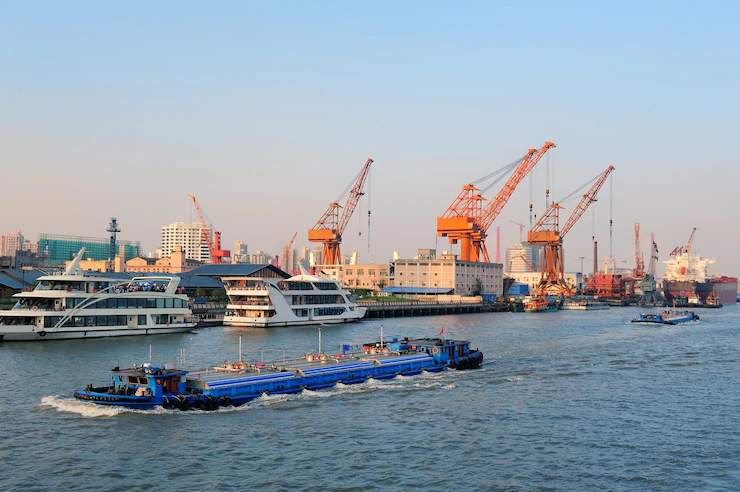How many jobs are available in marine transportation? The answer is simple there are many available jobs for whosoever wishes to get into the field of marine transportation.
Working in marine transportation can be an incredibly rewarding and exciting career path. With the right education and experience, you can find a job in this field that will provide you with financial security and a unique lifestyle.
Read on to learn more about the different jobs available and how to get started in this career field.
About Marine Transportation
Before we go on to look at how many jobs are available in marine transportation, you must, first of all, understand what marine transportation is and what it is all about.
Marine transportation refers to the movement of goods and people by water. This includes shipping via ocean-going vessels, as well as transportation on smaller bodies of water such as rivers and canals. Marine transportation is a critical component of global trade and commerce, as well as a popular form of leisure travel.
The marine transportation industry includes various types of vessels, ports and terminals, shipping companies, and logistics providers that work together to move cargo and passengers efficiently and safely. It also includes various modes of transport like cargo ships, tanker ships, container ships, barges, roll-on roll-off ships, tugs and barges, and passenger ships.
Marine transportation is vital to the global economy, as it allows for transporting goods and materials between different countries and continents.
How Many Jobs Are Available In Marine Transportation?
The number of jobs available in the marine transportation industry varies depending on factors such as global trade patterns, economic conditions, and technological advancements. However, in general, the marine transportation industry employs a significant number of people in a variety of roles.
Jobs available in marine transportation include;
Deck officers

Deck officers
Also known as navigational officers are responsible for the safe navigation and operation of a ship. The three main ranks of deck officers are:
- Captain (or Master)
The highest-ranking officer on the ship, the captain is responsible for the overall operation and safety of the ship and its crew. The captain is also the person legally responsible for the ship.
- First Mate (or Chief Officer)
The first mate is the captain’s second-in-command and assists the captain in the operation and navigation of the ship. The first mate also assumes the captain’s duties when the captain is unavailable.
- Second Mate (or Second Officer)
The second mate is the third-in-command of the ship and assists the captain and first mate in the operation and navigation of the ship.
Engineers

Engineers
Engineers in marine transportation are responsible for operating and maintaining the ship’s propulsion and electrical systems. They play a crucial role in ensuring that the ship is safe and operational, and they are responsible for tasks such as:
- Operating and maintaining the ship’s engines, generators, and other mechanical systems
- Monitoring and controlling the ship’s power and propulsion systems
- Conducting regular inspections of the ship’s mechanical systems to ensure they are in good working order
- Identifying and troubleshooting problems with the ship’s mechanical systems
- Making repairs and performing maintenance on the ship’s mechanical systems as needed
- Ensuring compliance with safety and environmental regulations
- Providing technical support to the deck officers as needed
There are many different engineering specialties in the field of marine transportation, including naval architects, who are in charge of designing ships, and marine engineers, who work on engines and other types of propulsion systems. Some engineers choose to specialize in a particular field, such as safety, navigation, or cargo management.
Shipbrokers and ship managers

Shipbrokers and ship managers
Shipbrokers and ship managers are important players in the marine transportation industry, and they play a key role in the commercial aspects of the shipping industry.
To become a ship broker or ship manager, a person typically must have a background in maritime business or a related field, and some may have a maritime education. Some shipbrokers and ship managers may have a background in shipping or logistics, and they may have experience working on ships or in other roles in the marine transportation industry.
Marine pilots

Marine pilots
Marine pilots are specialized navigators who guide ships in and out of ports and through restricted waterways. They play a critical role in ensuring the safe navigation of ships, and they are responsible for tasks such as:
- Boarding ships at the pilot station and taking control of the navigation of the vessel
- Planning the ship’s passage through the waterways, taking into account factors such as tides, currents, and weather conditions
- Communicating with the ship’s captain and crew to coordinate the ship’s movements
- Monitoring the ship’s progress and making adjustments as needed to ensure a safe and efficient voyage
- Providing guidance to the ship’s crew on the local laws, regulations, and customs related to navigation
- Disembarking the ship once it reaches the port or pilot station
Marine pilots are highly skilled navigators who have extensive knowledge of the local waterways and the ship’s capabilities. They typically have extensive experience working on ships and have a deep understanding of ship handling, navigation, and marine safety.
Other available jobs in marine transportation include;
- Marine Insurance Professional
- Marine consultants
- Marine surveyors
- Port operations jobs
- Maritime lawyer
- Deckhands
FAQ On How Many Jobs Are Available in Marine Transportation
Is Marine Transportation a Good Career Path?
Yes, those who are interested in working on the water might choose a profession in maritime transportation. You may anticipate a competitive salary and lots of promotion prospects if you work in the maritime transportation industry. Along with the financial advantages, you will have the chance to work in a variety of settings, including ports, harbors, rivers, lakes, and oceans.
Why Do We Need Marine Transportation?
International trade and the global economy both rely heavily on maritime transportation. Ships and shipping are crucial to the economies of both developed and developing nations, as well as to the employment and means of support for the billions of people that live in these nations.
For the economy, marine transportation is essential. It is in charge of international trade in commodities and goods. Additionally, marine traffic contributes to environmental cleanliness. By moving oil and other pollutants far from shorelines, it achieves this.
Summary
How many jobs are available in marine transportation is dependent on various factors, but there are a variety of opportunities in fields such as ship operations, logistics, and management as already listed in the contents.
The world economy relies heavily on maritime transit, which annually moves commodities valued at trillions of dollars. It is an essential component of global trade and a crucial factor in the transportation of people and products. Maritime transportation has a long history and will be a vital component of the global transportation network for a very long time.







Leave a Comment